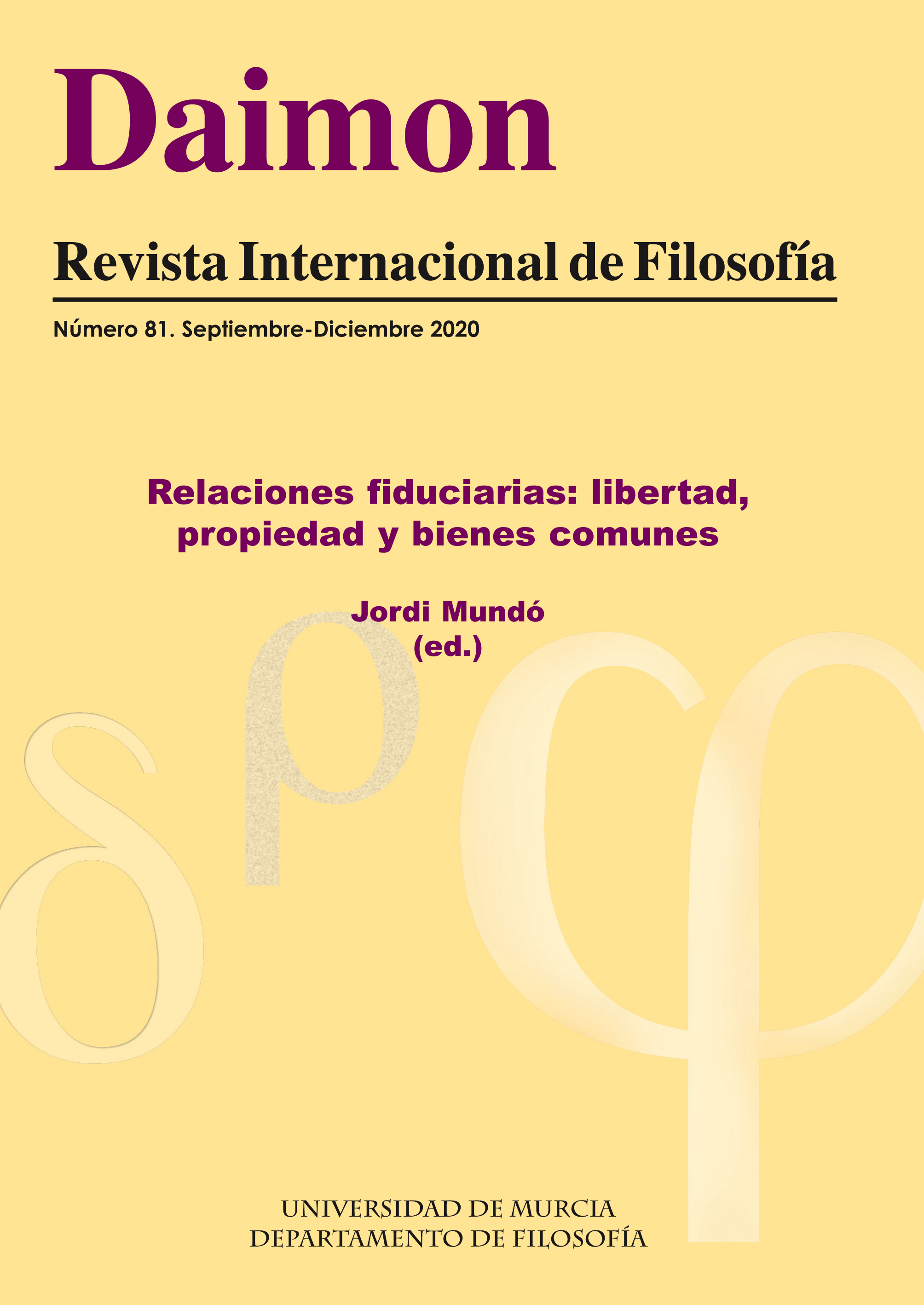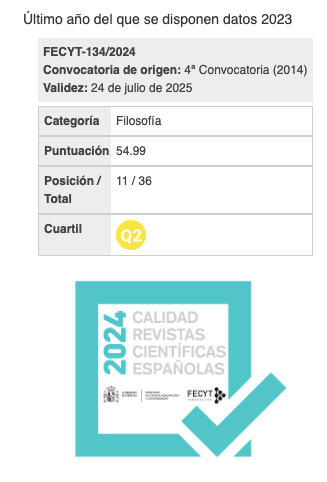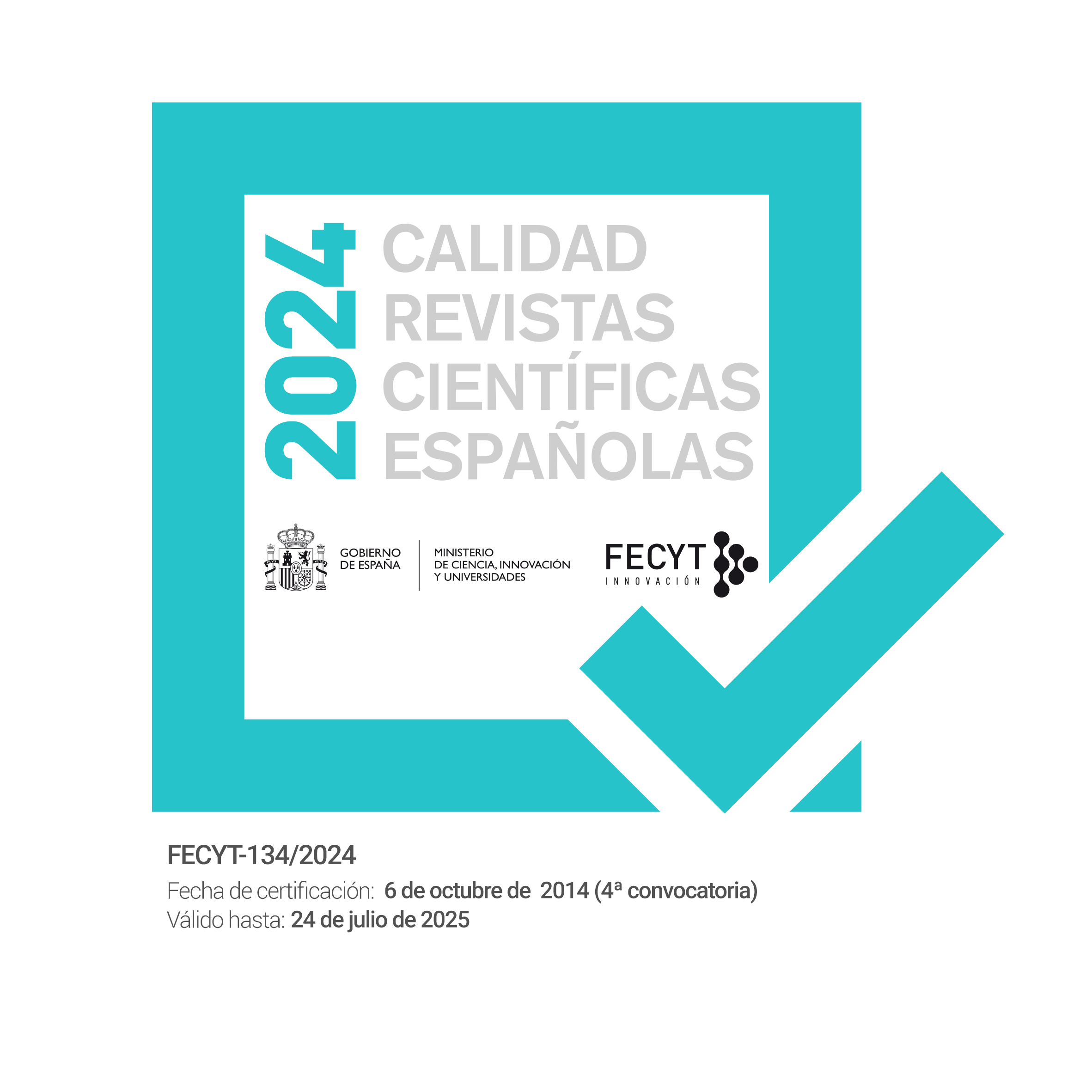Las relaciones fiduciarias y sus contextos: continuidades, analogías y metáforas. (Presentación del número monográfico)
Abstract
This monographic issue aims to contribute to the reflection on the interest of fiduciary relationships in several ways. Firstly, it wants to help clarify the conceptual and normative advantages and limitations of the fiduciary principle for contemporary philosophical-political reflection and practical politics. Secondly, it aspires to enrich our appreciation of the interlocking threads of the fiduciary constitution of the modern world by examining the developments of this idea in Europe and the United States. Thirdly, it seeks to refine our understanding of the potential of its application to various interconnected areas of philosophy, economics, sociology, and law. Finally, it is intended to propose historically and conceptually informed discussions on the relationship between republicanism and fiduciary principles.
Downloads
References
Avisheh, A. (1996), “The Origins of the Modern English Trust Revisited”, Tulane Law Review, 70(4), pp. 1139-1164.
Blackstone, W. (1979), Commentaries of the Laws of England: A Facmisile of the First Edition of 1765-1769, ed. Stanley N. Katz, 4 vols., Chicago: University of Chicago Press.
Cicero, M.T. (1928), De Officiis, trad. Walter Miller, London: William Heinemann.
Criddle, E.J. et al. (2018), “Introduction”, in: Criddle, E.J.; Fox-Decent, E.; Gold, A.S.; Kim, S.H.; Miller, P.B. (ed.), Fiduciary Government, Cambridge: Cambridge University Press, pp. 1-20.
Criddle, E.J., Miller, P.B. y Sitkoff, R.H. (2019), The Oxford Handbook of Fiduciary Law, Oxford: Oxford University Press.
DeMott, D. A. (1988), “Beyond metaphor: An analysis of fiduciary obligation”, Duke Law Journal, 5, pp. 879-924.
Frankel, T. (1983), “Fiduciary Law”, California Law Review, 71(3), pp. 795-836.
Frankel, T. (2011), Fiduciary Law, Oxford: Oxford University Press.
Holmes, O.W. (1899), “Law in Science and Science in Law”, Harvard Law Review, 12(7), pp. 443-463.
Kantorowicz, E. (1957), The King’s Two Bodies: A Study in Medieval Political Theology, Princeton, NJ: Princeton University Press.
Kantorowicz, E. (1984), Mourir pour la patrie, tr. L. Mayali y A. Schütz, Paris: Presses Universitaires de France.
Maitland, F.W. (1929 [1909]), Equity, Cambridge: Cambridge University Press.
Maksidi, G. (1981), The Rise of Colleges: Institutions of Learning in Islam and the West.
Edinburgh: Edinburgh University Press.
Massey, C. (1990), “American fiduciary duty in an age of narcissism”, Saskatchewan Law Review, 54(1), pp. 101-120.
Pollock, F.; Maitland, F.W., (1898), The History of the English Law Before de Time of Edward I, 2nd. ed., Cambridge: Cambridge University Press.
Scallen, E. A. (1993), “Promises broken v. promises betrayed: Metaphor, analogy, and the new fiduciary principle”, University of Illinois Law Review, 4, pp. 897-980.
Schoenblum, J. A. (1999), “The role of legal doctrine in the decline of the islamic waqf: comparison with the trust”, Vanderbilt Journal of Transnational Law, 32(4), pp. 1191- 1228.
Seipp, D. J. (2011), “Trust and fiduciary duty in the early common law”, Boston University Law Review, 91(3), pp. 1011-1038.
Sèneca, L.A. (1926), Diàlegs a Serè; De la clemència, trad. C. Cardó, Barcelona: Fundació Bernat Metge.
Sunstein, C. R. (1993), “On analogical reasoning”, Harvard Law Review, 106(3), pp. 741- 791.
Ullmann, W. (1969), The Carolingian Renaissance and the Idea of Kingship, London: Methuen.
Yeager, D. (2017), “Fiduciary-isms: study of academic influence on the expansion of the law”, Drake Law Review, 65(1), pp. 179-222.
Las obras que se publican en esta revista están sujetas a los siguientes términos:
1. El Servicio de Publicaciones de la Universidad de Murcia (la editorial) conserva los derechos patrimoniales (copyright) de las obras publicadas, y favorece y permite la reutilización de las mismas bajo la licencia de uso indicada en el punto 2.
2. Las obras se publican en la edición electrónica de la revista bajo una licencia Creative Commons Reconocimiento-NoComercial-SinObraDerivada 3.0 España (texto legal). Se pueden copiar, usar, difundir, transmitir y exponer públicamente, siempre que: i) se cite la autoría y la fuente original de su publicación (revista, editorial y URL de la obra); ii) no se usen para fines comerciales; iii) se mencione la existencia y especificaciones de esta licencia de uso.
3. Condiciones de auto-archivo. Se permite y se anima a los autores a difundir electrónicamente las versiones pre-print (versión antes de ser evaluada) y/o post-print (versión evaluada y aceptada para su publicación) de sus obras antes de su publicación, ya que favorece su circulación y difusión más temprana y con ello un posible aumento en su citación y alcance entre la comunidad académica. Color RoMEO: verde.














